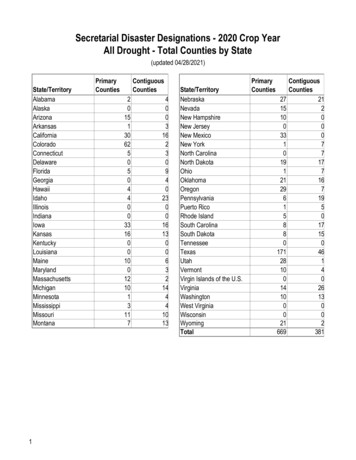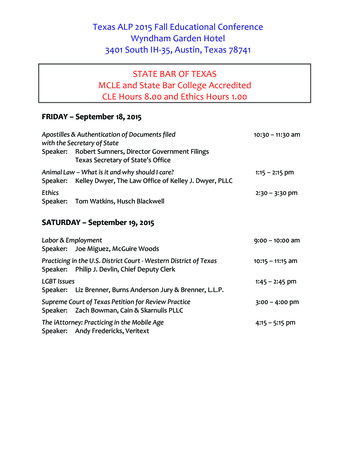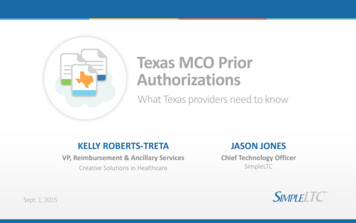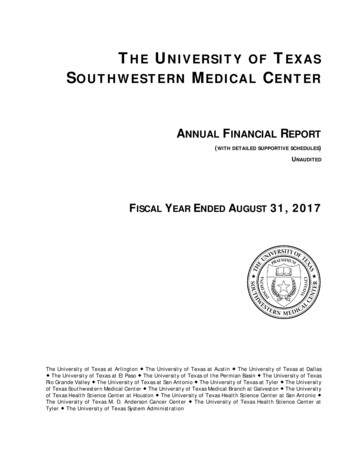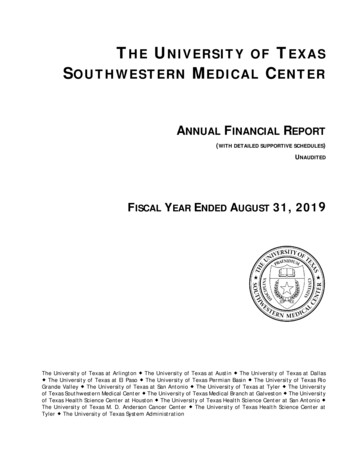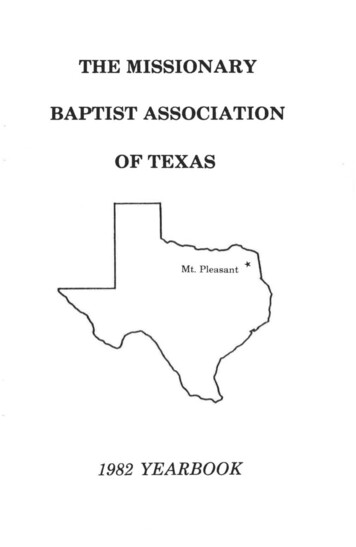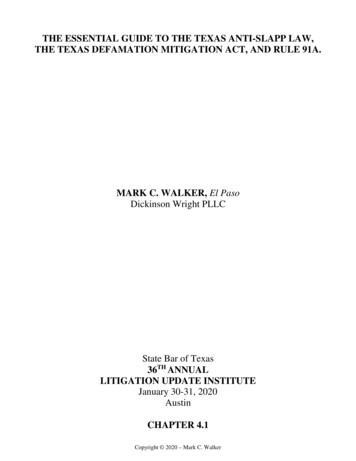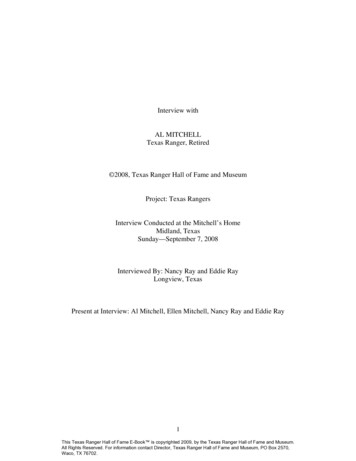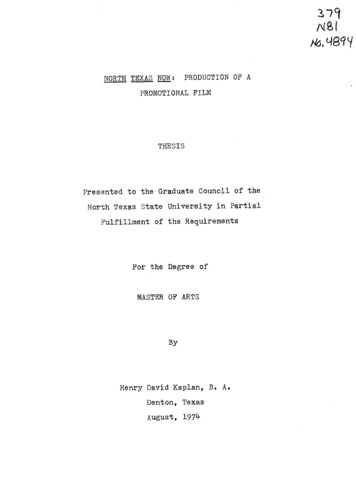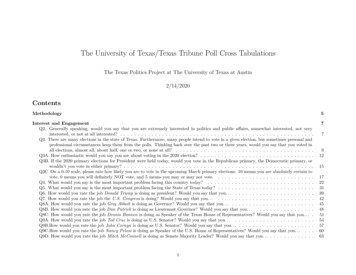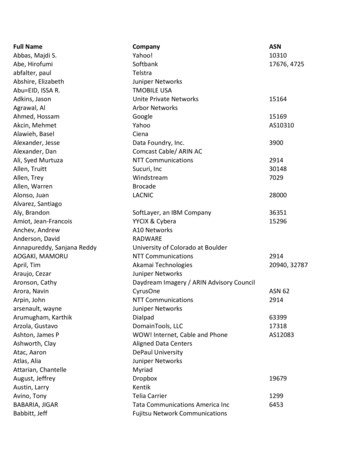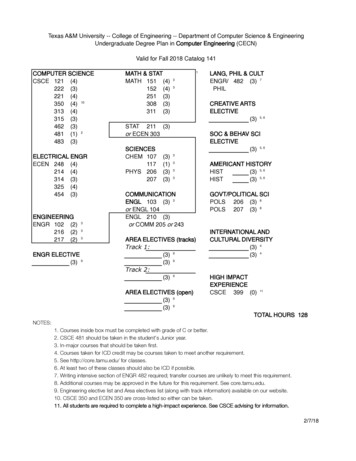
Transcription
Texas A&M University -- College of Engineering -- Department of Computer Science & EngineeringUndergraduate Degree Plan in Computer Engineering (CECN)Valid for Fall 2018 Catalog 141COMPUTER SCIENCECSCE 121 (4)222 (3)221 (4)350 (4) 10313 (4)315 (3)462 (3)481 (1) 2483 (3)ELECTRICAL ENGRECEN 248 (4)214 (4)314 (3)325 (4)454 (3)ENGINEERINGENGR 102 (2)216 (2)217 (2)3MATH & STATMATH 151 (4)152 (4)251 (3)308 (3)311 (3)133CREATIVE ARTSELECTIVE(3)STAT 211 (3)or ECEN 303SCIENCESCHEM 107117PHYS 206207(3)(1)(3)(3)ENGR ELECTIVE(3) 95, 6SOC & BEHAV SCIELECTIVE(3) 5, 63333COMMUNICATIONENGL 103 (3) 3or ENGL 104ENGL 210 (3)or COMM 205 or 24333LANG, PHIL & CULTENGR/ 482 (3) 7PHILAREA ELECTIVES (tracks)Track 1:(3) 9(3) 9Track 2:(3) 9AREA ELECTIVES (open)(3) 9(3) 9AMERICANT HISTORYHIST(3) 5, 6HIST(3) 5, 6GOVT/POLITICAL SCIPOLS 206 (3) 8POLS 207 (3) 8INTERNATIONAL ANDCULTURAL DIVERSITY(3) 4(3) 4HIGH IMPACTEXPERIENCECSCE 399 (0)11TOTAL HOURS 128NOTES:1. Courses inside box must be completed with grade of C or better.2. CSCE 481 should be taken in the student's Junior year.3. In-major courses that should be taken first.4. Courses taken for ICD credit may be courses taken to meet another requirement.5. See http://core.tamu.edu/ for classes.6. At least two of these classes should also be ICD if possible.7. Writing intensive section of ENGR 482 required; transfer courses are unlikely to meet this requirement.8. Additional courses may be approved in the future for this requirement. See core.tamu.edu.9. Engineering elective list and Area electives list (along with track information) available on our website.10. CSCE 350 and ECEN 350 are cross-listed so either can be taken.11. All students are required to complete a high-impact experience. See CSCE advising for information.2/7/18
Computer Engineering Area electives Fifteen (15) hours of CE area electives are required (5 courses). Students are required to take at least two courses from the same track and at least one from a differenttrack. The remaining courses can be from the depth track lists below or any approved 300/400 levelcourse in CSCE or ECEN. Consult your advising office to determine if a course is approved. #A few courses are in multiple tracks-each course can only be used in one place on your degree plan.You cannot use the course in two places. Depth tracks are subject to change. Consult your advising office for the current list.Depth Tracks1. Communications and Networks CSCE 463 (3), Computer Networks CSCE 464 (3), Wireless and Mobile Systems #CSCE 465 (3), Computer and Network Security ECEN 423 (3), Computer and Wireless Networks ECEN 424 (3), Fundamentals of Networking #ECEN 434 (3), Optimization for Electrical and Computer Engineering #ECEN 455 (4), Digital Communications ECEN 478 (3), Wireless Communications MATH 470 (3), Comm. & Cryptography2. VLSI CSCE 469/ECEN 469 (3), Advanced Computer Architecture ECEN 468 (4), Advanced Logic Design ECEN 474 (4), VLSI Circuit Design ECEN 475 (4), Intro. to VLSI Sys. Design ECEN 326 (4), Electronic Circuits3. Software Systems CSCE 314 (3), Programming Languages CSCE 410 (3), Advanced OS CSCE 411 (3), Design and Analysis of Algorithms CSCE 431 (3), Software Engineering CSCE 434 (3), Compiler Design CSCE 435 (3), Parallel Computing CSCE 442 (3), Scientific Programming CSCE 451 (3), Software Reverse Engineering #CSCE 465 (3), Computer and Network Security CSCE 469/ECEN 469 (3), Advanced Computer Architecture #ECEN 434 (3), Optimization for Electrical and Computer Engineering4. Signal/Image Processing & Graphics CSCE 441 (3), Computer Graphics CSCE 443 (3), Game Development ECEN 444 (3), Digital Signal Processing ECEN 447 (4), Digital Image Processing ECEN 448 (3), Real time DSP5. Robotics/Embedded Systems CSCE 420 (3), Artificial Intelligence CSCE 452 (3), Robotics CSCE 456 (4), Real-time Computing9/25/18
ECEN 420 (3), Linear Control systems ECEN 422 (3), Control Engineering and Design Methodology6. Information CSCE 310 (3), Database systems CSCE 436 (3), Computer Human Interaction CSCE 444 (3), Structures of Interactive Info. CSCE 470 (3), Information Storage & Retrieval CSCE 438 (3), Distributed Objects #ECEN 455 (3), Digital Communications9/25/18
Computer EngineeringEngineering Electives, Fall 2018 catalogThe following courses have been approved for use in the Computing Engineeringmajor as Engineering Electives: MEEN 221, Statics and Particle Dynamics (3). Prerequisites: admission toupper division in an engineering major; MATH 251 or 253 or registrationtherein; PHYS 218. MEEN 222/MSEN 222, Materials Science (3). Prerequisites: CHEM 102, or104 and 114, or CHEM 107/117; PHYS 218. MEEN 315, Principles of Thermodynamics (3). Prerequisites: MEEN 221;MATH 251 or 253. MATH 414, Fourier Series and Wavelets (3). Prerequisites: MATH 304, 311or 325. MATH 442 (3), Mathematical Modeling (3). Prerequisites: MATH 304 and308 or equivalents. MATH 471, Communications and Cryptography II (3). Prerequisites: MATH470 or consent of instructor. PHYS 221, Optics and Thermal Physics (3). Prerequisites: PHYS 208 or 219;MATH 152 or 172; registration in MATH 221; 308. PHYS 222, Modern Physics for Engineers (3). Prerequisites: PHYS 208 or219; MATH 308 or registration therein.Prerequisites are as listed at catalog.tamu.edu.9/25/18
Department of Computer Science and EngineeringDwight Look College of EngineeringTexas A&M UniversityComputer Engineering Computer Science Track (CECN)Catalog 141, 2018-19First SemesterFRESHMAN YEAR(Th-Pr)CrSecond SemesterCHEM 107 Gen. Chem. for Eng. Students(3-0)3CHEM 117 Gen. Chem. for Eng. Stu. LabENGL 103 Introduction to Rhetoric andComposition or ENGL 104 Composition andRhetoricENGR 102 Engineering Lab I - ComputationMATH 151 Engineering Mathematics IUniversity Core Curriculum elective1(0-3)(3-0)13ENGR 216 Experimental Physics andEngineering Lab II: MechanicsMATH 152 Engineering Mathematics IIPHYS 206 Newtonian Mechanics for Engineeringand versity Core Curriculum elective12615SOPHOMORE YEARFirst SemesterCSCE 121 Intro. Prog. Design and ConceptsECEN 248 Digital Sys. DesignENGR 217 Experimental Physics andEngineering Lab III: Electricity and MagnetismMATH 251 Engineering Mathematics IIIPHYS 207 Electricity and Magnetism forEngineering and Science(3-2)(3-3)(1-3)442Second SemesterCSCE 221 Data Struct. and Algo.CSCE 222 Discrete Struct. for ComputingECEN 214 Electrical Circuit Theory(3-2)(3-0)(3-3)434(3-0)(3-0)33MATH 308 Differential EquationsSTAT 211 Principles of Statistics I(3-0)(3-0)331617JUNIOR YEARFirst SemesterCSCE 313 Intro. to Computer SystemsCSCE 350 Comp. Arch and DesignECEN 314 Signals and SystemsMATH 311 Topics in Applied Math ICommunication elective4(3-2)(3-3)(3-0)(3-0)(3-0)44333Second SemesterCSCE 315 Programming StudioCSCE 462 Microcomputer SysCSCE 481 SeminarECEN 325 ElectronicsECEN 454 Digital Int. Circuit DesUniversity Core Curriculum elective1CSCE 399 High Impact 1-6)333331517SENIOR YEARFirst SemesterENGR 482 Ethics and EngineeringENGR Elective3Area elective2Area elective2Area elective2(2-2)3333315Second SemesterCSCE 483 Computer Sys. DesignArea elective2Area elective2University Core Curriculum elective1University Core Curriculum elective1NOTES: Grade Requirements: A grade of C or better is required for each of the following courses: CSCE 121, CSCE 221, CSCE 222, CSCE 313,CSCE 315, CSCE 350, CSCE 462, CSCE 481, CSCE 483; ENGR 102, ENGR 216, ENGR 217; ECEN 214, ECEN 248, ECEN 314, ECEN 325,ECEN 454; MATH 151, MATH 152, MATH 251, MATH 308, MATH 311; CHEM 107/CHEM 117, PHYS 206, PHYS 207; ENGL 104.1. To be selected from the University Core Curriculum. Of the 18 hours shown as University Core Curriculum electives, 3 must be fromcreative arts, 3 from social and behavioral sciences, 6 from American history, and 6 from Government and Political Science. Therequired 6 hours from international and cultural diversity may be met by courses satisfying the creative arts, social and behavioralsciences, and the history requirements if they are also on the approved list of international and cultural diversity courses.2. 15 hours of area electives chosen in consultation with academic advisor.3. Three hours of coursework to be approved by student’s advisor.4. Select from ENGL 210 or COMM 205 or 243.2/7/2018
Undergraduate Degree Plan in Computer Engineering – Computer Science Track (CECN), Catalog 141 (2018-2019)Department of Computer Science and Engineering, College of Engineering, Texas A&M University12ENGR 102(2)*3CSCE 121 (4)*45678CSCE 222 (3)*CSCE 313 (4)*CSCE 462 (3)*CSCE 221 (4)*CSCE 350/ECEN 350 (4)*CSCE 315 (3)*Area Elective(3)Area Elective(3)ECEN 454 (3)*Area Elective(3)Area Elective(3)ECEN 325 (4)*Area Elective(3)CSCE 483 (3)*ECEN 248 (4)* See notesENGR 216(2)*ENGR 217(2)*PHYS 206 (3)*PHYS 207 (3)*ECEN 214 (4)*ECEN 314 (3)*MATH 152 (4)*MATH 251 (3)*MATH 308 (3)*MATH 311 (3)*ENGL 104 or103 (3)*MATH 151 (4)*CSCE 399 (0)CHEM 107 (3)*CHEM 117 (1)*STAT 211 (3)CSCE 481 (1)*ENGR Elective(3)UCC (3)ENGR/PHIL482 (3)UCC (3)UCC (3)UCC (3)UCC (3)16 hrs15 hrs16 hrs17 hrsNOTES Courses marked with an asterisk (*) must be completed with grade of C orbetter. ECEN 248 prerequisites: PHYS 206, MATH 152 CSCE 481 should be taken in the student’s junior year. Writing intensive section of ENGR 482 required; transfer courses must beapproved.Comm. Elective(3)UCC (3)17 hrs17 hrsPrerequisiteCo-requisitePrerequisite (implied)15 hrs15 hrs UCC: University core curriculum elective; 3 must be from Creative Arts, 3from Social and Behavioral Sciences, 6 from American History, and 6 fromGovernment and Political Science. Comm. Elective: one of ENGL 210 or COMM 205 or COMM 243 ENGR Elective: 3 hours of coursework to be approved by student’s advisor . Additional Requirements: 6 hrs of International and Cultural Diversitycourses (can be used to satisfy another requirement).2/7/2018
DEGREE PLAN INSTRUCTIONS FORCOMPUTER ENGINEERING MAJORS (CS TRACK)2018-2019 Academic yearThe instructions contained in this packet are to be used as a guide in preparing the Departmental ofComputer Science and Engineering (CSCE) Degree Plan Form for the Bachelor's Degree in ComputerEngineering (CECN). A degree plan is required to be filed in Howdy by the student’s third semester at theUniversity.Degree audits are produced by the Registrar's Office and can be viewed on-line at howdy.tamu.edu. Theaudit should be carefully reviewed by the student with his/her advisor, to determine the progress toward adegree.Total Hours RequiredThe total hours on the degree plan must be at least 128. Note that the 128 hours does not include the twoInternational and Cultural Diversity courses. This is because these classes can be used to satisfy both theInternational and Cultural Diversity requirement and another requirement on the degree plan—see ourWeb page for a list of the courses that can be used in this way. This is the only place where one coursecan be used in two places on the degree plan.Please note that the 128 total hours do not include a required foreign language. It is the student'sresponsibility to meet the University's foreign language requirement.Comments and ObservationsBefore visiting the Undergraduate Advisor about a degree plan, the student should make as manydecisions as possible. One problem area is transfer credits. It is sometimes difficult to know whichcourses may be used. Efforts are made to allow 'reasonable' substitutions. A student must submit a copyof his/her transcript evaluation and a completed substitution form along with the degree plan form ifcredit for transferred courses is desired. To approve courses that transfer "By Title" to TAMUdocumentation of the courses content, such as a catalog description, will be required.It is the student's responsibility to have a degree plan meet minimum requirements. Everyone involvedwill check, but if a graduating senior's degree plan is not acceptable (e.g., only 127 hours), the studentwill not graduate until the problems have been corrected.Required CoursesTake all courses listed on the Degree Plan. All courses inside the boxes must be passed with a grade of“C” or better.CE Area Elective CoursesFifteen (15) hours of CE area electives are required (5 courses). In meeting this requirement, students arerequired to take at least two courses from the same track and at least one from a different track. Thelisting of depth tracks is provided separately. The remaining courses can be chosen from approved CPSC,ECEN, or ENGR 385/270/470 classes:Computer Science and Engineering Courses (CSCE)Take any 300 or 400 courses from the Computer Science and Engineering Department9/25/18
that are not included in the required courses list. Students wishing to use CSCE 485,CSCE 489, or CSCE 491 must receive approval from the undergraduate advisor (CSCEdept.).Electrical and Computer Engineering Courses (ECEN)Take ECEN 322, ECEN 326, ECEN 338, 351, 370 or any ECEN 400 course except forthose already required (e.g., ECEN 454) or equivalent to one required (e.g., ECEN 449).Students wishing to take ECEN 485 or ECEN 489 must receive approval from the CSCEdept. undergraduate advisor.Other CoursesENGR 385 (co-op) credits and EPICS (ENGR 270 and 470) credits may be used to fulfillCE area elective requirements. Excess credits above 3 cannot be used. Students areallowed to combine ENGR 385 credits with EPICS course credits; see CSCE advising fordetails.Engineering Technical Elective courseA three (3) hour Engineering Technical Elective course is required. The list of approved courses isprovided separately.High Impact ExperienceAll students must complete a high-impact experience in order to graduate. These are often referred to inthe college as ENGR[X] classes. They will generally include classes such as independent research, studyabroad, and co-op experience. The list of specific items that can satisfy this requirement as well asindication of any additional documentation required will be available from the CSCE advising office.University Core Curriculum coursesRefer to core.tamu.edu for information on the core curriculum courses. The following degree-specificadjustments to the core curriculum should be noted:Communication: the Communication requirement must be filled by taking two courses: ENGL 103 or ENGL 104 One of the following: ENGL 210, COMM 205, COMM 243Mathematics: the Mathematics requirements must be filled by the courses specified in the degree planLife and Physical Sciences: the requirement must be filled by the courses specified in the degree planLanguage, Philosophy, and Culture: the requirement must be filled by ENGR 482 (or PHIL 482),which is a required course. You must take a writing intensive section (a “900” section) of this course.The University’s core curriculum requirements are unchanged in the following areas: Creative Arts;American History; Government/Political Science; and Social and Behavioral Sciences. The Internationaland Cultural Diversity requirement is unchanged from the University’s requirements. Follow theUniversity’s instructions in these areas.Foreign Language RequirementProficiency in a foreign language is required to graduate from Texas A&M University. This requirementcan be met by: Completing two units (two full years) of high school course work in the same foreign language. Completing two semesters (one full year) of course work at the college level in the same foreignlanguage, or Demonstrating proficiency in a foreign language by examination. See the undergraduate catalogfor additional requirements under graduation requirements and Foreign Language.CECN instructions--page 2 of 2
Computer Engineering Area electives Fifteen (15) hours of CE area electives are required (5 courses). Students are required to take at least two courses from the same track and at least one from a different track. The remaining courses can be from the depth track lists below or any approved 300/400 level course in CSCE or ECEN.
